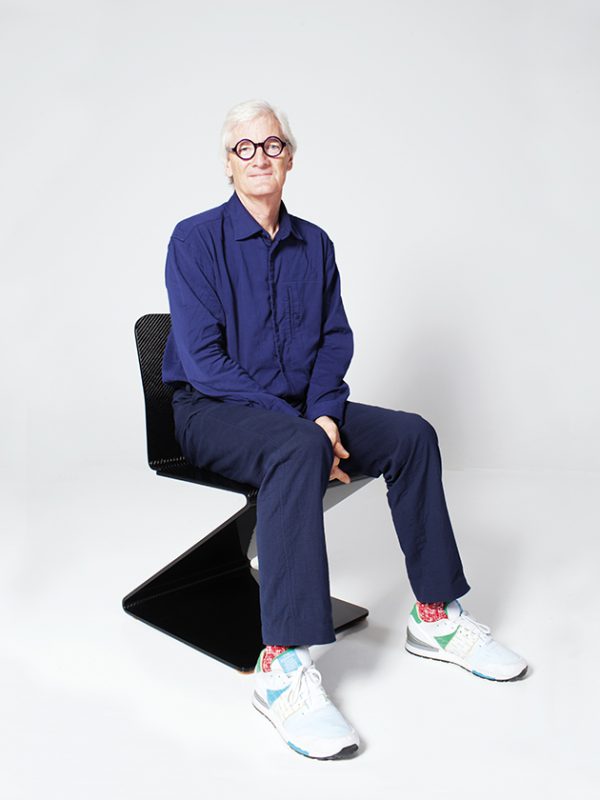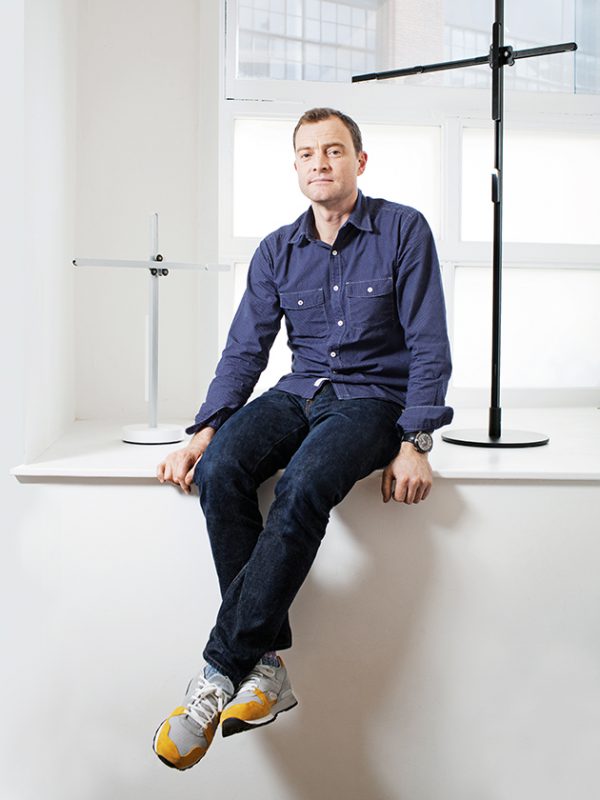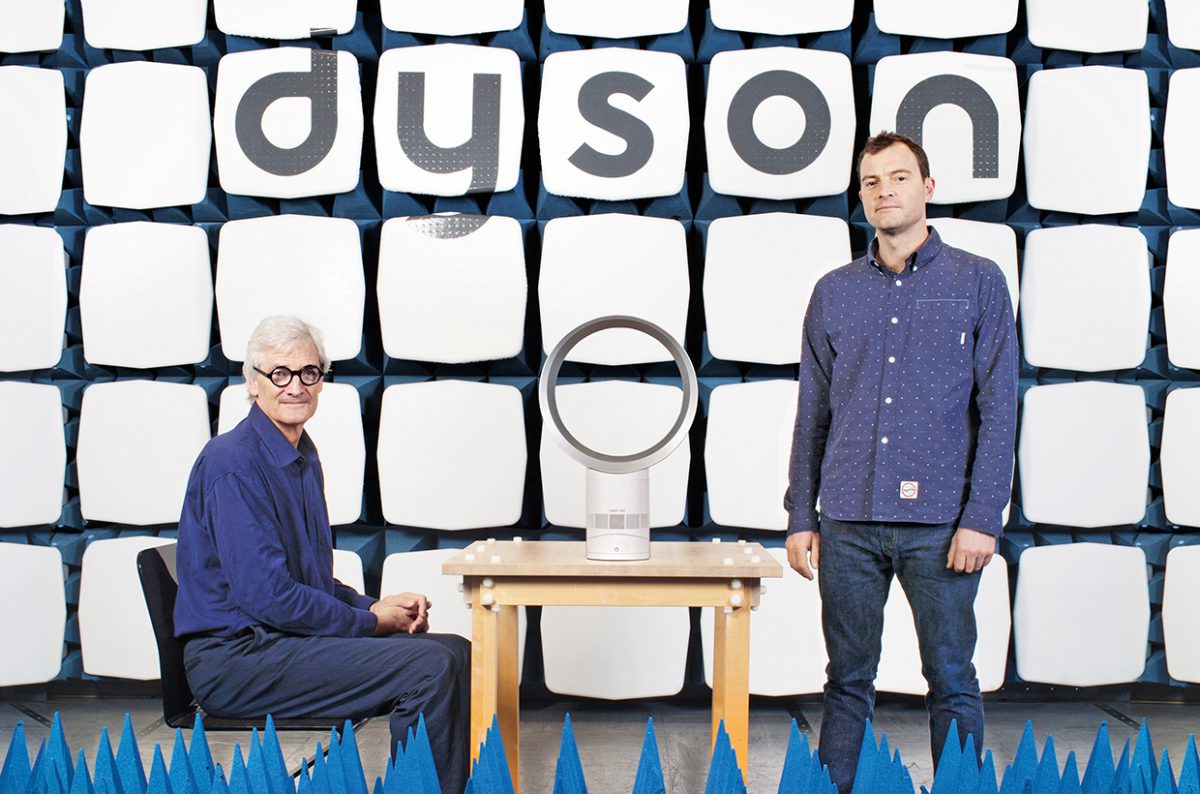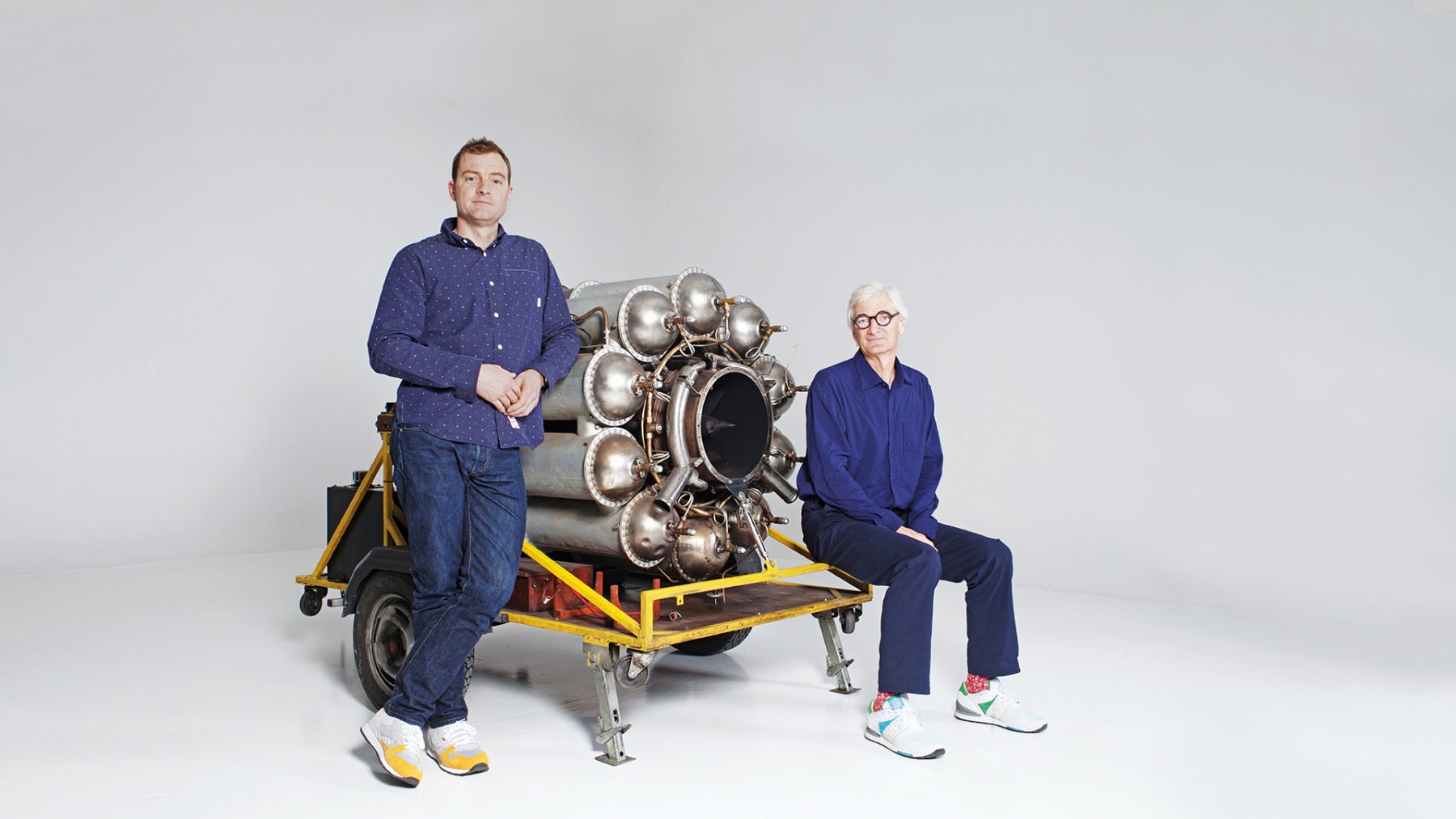The Tinkering Gene by Esther Strerath | 6th December, 2019 | Personalities
He’s the greatest inventor of our time. James Dyson has revolutionized the vacuum cleaner and the way we dry our hands and hair. Now, together with his son, Jake, he’s banking on robots and artificial intelligence.
Daily life, revisited: The man has invented the bagless vacuum cleaner, bringing a futuristic flair to housework in the process; his hand dryers hang in public washrooms the world over; and he turned hairdryers into marvels of technology. James Dyson, the U.K.’s most innovative entrepreneur, is a man of many talents. Just like his son, Jake. For both of them, setbacks are all part of the game. Because according to company philosophy, mistakes are the only way to learn. In October, Dyson had to halt his biggest project to date – a completely self-developed electric car, a vehicle the likes of which have never been seen before, slated to launch in two years’ time.
Dyson shapes the future, and always has. The company belonging to Sir James Dyson, who was knighted by the Queen in 2006, has grown from a vacuum cleaner manufacturer into a technology corporation: In 2018, he generated revenue of $5.8 billion with more than 60 products. And yet, insists the self-made billionaire, “I’m not a businessman.”
But he was already a long-distance runner back in his school days. “I was quite good at it. Not because I was physically good, but because I had more determination. I learnt determination from it,” explained the boyish Brit (and grandfather of seven) in his autobiography. His eldest son, Jake, has been at his side since joining the firm in 2015 and is meanwhile director of research and development. Even as a child, he spent his vacations helping to build prototypes, and today his father says Jake’s the more inventive one. There are strong parallels between their careers.
Originally, James Dyson wanted to go into medicine or become an artist. On the advice of a doctor, he chose art and enrolled at the Byam Shaw School before ending up at the Royal College of Art, where he studied product design. Jake Dyson studied design at Central Saint Martins College. His finals project was a water system that generated electricity. In his day, his father submitted a design for a high-speed fiberglass landing craft.
“I hate science fiction, I don’t think it’s very clever. It’s easy to imagine what the world would be like.” SIR JAMES DYSON
After that, Dyson Sr. developed a wheelbarrow with a ball instead of a wheel. The idea made the vehicle easier to push in all directions, but Dyson couldn’t find a producer. His second attempt was to be a vacuum cleaner, the likes of which had never been seen before because it didn’t have a bag. In the 1980s, he built no fewer than 5,127 prototypes in the shed behind his house, while his wife Deirdre kept the wolf from the family of five’s door with her job as an art teacher. But it was all to no avail: Once again, he couldn’t find a manufacturer. Back then, nobody wanted to give up dust bags: They were a great source of income.
Jake’s story is similar. After giving the London interiors scene a try and designing bars and cafés, he eventually answered his father’s call in the late 1990s. However: “It was like moving back in with my parents,” he once said. So he rented a studio in London’s Clerkenwell district, started tinkering with light and founded a lighting company under his own name in 2004. The standout feature: Thanks to a special cooling system, the LEDs don’t heat up, enabling them to achieve a life span of 35 to 40 years. The benefit wasn’t apparent to major manufacturers. It was the same story as with the vacuum cleaner bags: Selling LEDs was simply too good a business. In 2011, Jake launched a series of products with a minimalist design and swivel heads. “CSYS” became an international hit – so much so that his father James bought the firm in 2015.
He could easily afford it. The story of the bagless vacuum cleaner turned out to have a very happy ending and Dyson made billions. He’d eventually borrowed the startup capital and built it himself. A small Japanese company placed the first order and saved him from bankruptcy. He used the first revenue to found his own company in 1991. Just 18 months later, his “DC 01” was the best-selling vacuum cleaner in the U.K.
“My father’s not going anywhere. He will be here until he’s 100 years old…” JAKE DYSON
In the meantime, he produces in Asia and lives in Singapore – in a huge penthouse with a 360-degree panorama. The fact that the Brexit advocate not only moved into new corporate headquarters there in 2019 but also chose Singapore as the manufacturing base for hair dryers, air purifiers and the planned Dyson car caused a lot of hard feelings in the U.K. Wrongly so. James Dyson invests millions of pounds a year in research programs in his home country. His British headquarters, which opened in 1993 and have been growing ever since, are a 1 1/2-hour drive to the west of Oxford. It’s here of all places, in the historic little town of Malmesbury, that the future is divined. And that’s not all: It’s also where Dyson has been running his own talent incubator, the Dyson Institute, for the last two years. It currently accommodates 50 students who get to put theory to the test alongside approximately 4,000 Dyson engineers.
The Institute works on improvements to the company’s own products and conducts research into all sorts of things – from bicycle helmets to sources of food. Dyson grows vegetables too, and supplies them to customers like British supermarket chain Waitrose. Because in fact, the Dyson philosophy isn’t so much focused on inventions as on “solving problems,” as the father-and-son team is keen to point out. In Malmesbury, students are paid a salary, accommodation is free and there’s a hangar for working off frustrations about a failed prototype with a round of boxing or yoga. If Sir James Dyson happens to be there, he’ll probably say: You don’t learn anything from success.
“In order to fix it, you need a passionate anger about something that doesn’t work well.” SIR JAMES DYSON
In short: Dyson develops products in the U.K. and builds them in Singapore, Malaysia and the Philippines – the gateways to Asia, his main sales market. Near his head office in Malmesbury, the entrepreneur has bought another site measuring 210 hectares – a former military air base in Hullavington. That’s where his team was working on the prototypes for his biggest dream of all, an electric car. But in October, totally out of the blue, Dyson put the brakes on. The project was axed. Instead, he said, the company will forge ahead with robotics and artificial intelligence. But the years of research weren’t in vain: The solid-state batteries that were specially developed for the vehicle, for instance, are to be used in other products. The former military base was once used for testing aircraft. Who knows: That could well put new ideas in the Dysons’ heads – they know a thing or two about air, after all.







